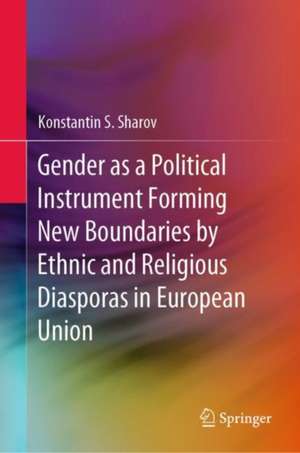Gender as a Political Instrument Forming New Boundaries by Ethnic and Religious Diasporas in European Union
Autor Konstantin S. Sharoven Limba Engleză Hardback – 20 mar 2022
| Toate formatele și edițiile | Preț | Express |
|---|---|---|
| Paperback (1) | 724.32 lei 6-8 săpt. | |
| Springer Nature Singapore – 21 mar 2023 | 724.32 lei 6-8 săpt. | |
| Hardback (1) | 730.35 lei 6-8 săpt. | |
| Springer Nature Singapore – 20 mar 2022 | 730.35 lei 6-8 săpt. |
Preț: 730.35 lei
Preț vechi: 890.66 lei
-18% Nou
Puncte Express: 1096
Preț estimativ în valută:
139.77€ • 144.20$ • 118.29£
139.77€ • 144.20$ • 118.29£
Carte tipărită la comandă
Livrare economică 04-18 martie
Preluare comenzi: 021 569.72.76
Specificații
ISBN-13: 9789811906947
ISBN-10: 9811906947
Pagini: 226
Ilustrații: XVII, 226 p. 64 illus., 47 illus. in color.
Dimensiuni: 155 x 235 mm
Greutate: 0.52 kg
Ediția:1st ed. 2022
Editura: Springer Nature Singapore
Colecția Springer
Locul publicării:Singapore, Singapore
ISBN-10: 9811906947
Pagini: 226
Ilustrații: XVII, 226 p. 64 illus., 47 illus. in color.
Dimensiuni: 155 x 235 mm
Greutate: 0.52 kg
Ediția:1st ed. 2022
Editura: Springer Nature Singapore
Colecția Springer
Locul publicării:Singapore, Singapore
Cuprins
Political correctness and gender behavioural patterns: Incongruence of West European title nationalities and diasporas.- Gender education for secondary school: Perplexities in diasporas.- Classical social institute of marriage and new types of demographic behaviour: EU’s title nationalities vs diasporas.- Gender extimity as a psychological technique of EU’s democratizing its population: Efforts and reaction of diasporas.- Gender communicative and behavioural stereotypes: Case of the Indian diaspora in the EU.- Fashion in clothes as a political instrument of (re)shaping gender social roles: Reaction of Muslim diasporas to the EU’s initiatives.- Genderizing the Christian Bible: Towards a unified EU’s religion?.- Towards a new gender-neutral deity? Resistance of Jewish diaspora.- Rethinking female roles in Christian culture: A case of Latin American diasporas in the EU.- Reception of the EU’s ideology of gender equality by Chinese diaspora in Europe: Gender and Confucianism.
Notă biografică
Konstantin Sergeevich Sharov, Ph.D., Doctor of Theological Science, B.Sc., M.Sc., is a Russian political science researcher, chemist, sociologist, and lay theologian. He is the author of several monographs and more than 150 research papers in peer-reviewed periodical journals. His areas of expertise include gender studies, democracy and authoritarianism in globalized world, public health, healthcare law, and inequality.
Textul de pe ultima copertă
This book considers gender as a convenient tool for making new boundaries within the European Union. It offers a political analysis based on sociological surveys conveyed by the author in 2008–2021. It emphasises the utmost necessity of a proper understanding of specific gender political technologies applied in ethnic and religious diasporas within the EU borders, by EU ruling elites, to avoid ideological collapse in relations with diaspora political groups and general members. The book demonstrates that uncritical application of EU gender equality programs within diasporas may transform gender to a dangerous political force destabilising the European Union. The monograph will be of interest for political science researchers, legislators, and administrators that work with political dimension of gender.
Caracteristici
Offers an unbiased and non-ideologized analysis of uncritical adoption of gender equality programs Demonstrates deficiencies of One Humanity political model Provides research results based on author’s sociological surveys
